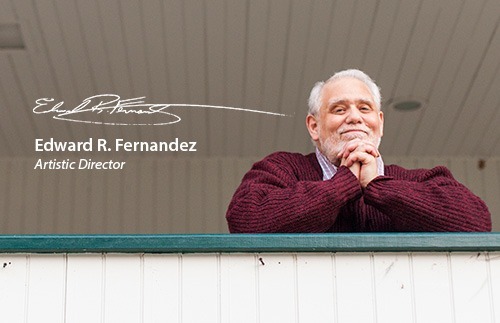“Passion is about how the force of somebody’s feelings for you can crack you open, and how it is the life force in a deadened world”. – Stephen Sondheim
_____
Often performed in only one act, Passion is Stephen Sondheim’s adaptation of the 1869 novel Fosca, by Igino Ugo Tarchetti, and the 1981 Ettore Scola film, Passione d’Amore. Its trademark Sondheim sound mixes layered vocals with a complex storyline of passion, devotion, and the ultimate cost of true love.
For the 2023 season, EPAC is paying tribute to Stephen Sondheim by producing two of his works and a concert. As the Artistic Director, I made the decision to produce Passion, in particular, because it is one of Sondheim’s least-produced major works – this might also be because it is one of his most polarizing works. Some audience members and fellow theater lovers are incredibly moved by the work, while others think it is unbelievable, and in fact, glorifies stalking behavior. I, of course, fall into the former category.
The story of Passion is simple. Giorgio is a soldier who is having an affair with a married woman, Clara, when he is sent to a military outpost. Once there, he meets the Colonel’s sickly cousin, Fosca, who becomes obsessed with him and relentlessly pursues him.
Sondheim himself said that the show is one long love song or a rhapsody. So, when directing the production, I wanted to create a production that flowed effortlessly from one scene to the next without the interruption of scenic elements moving in and out to achieve Sondheim’s vision.
Given the limitations of the theater (EPAC), I decided to make the production a “memory piece” with everything taking place in Giorgio’s memory of the events in the story. Passion ends with Giorgio in his sickbed, recovering from an illness brought on by events in the recent past, so why not start there and give the piece a cyclical narrative? The scenes flow from one to the other, like a recalled memory or a fever dream. Since it all takes place in Giorgio’s memory while on his sickbed, the production never leaves that sick room. Various places in the sick room become all different locations in the story. Thus, leaving naturalism behind, a bed can become a dining or pool table, a bench can become a window or a settee. This concept not only lets Passion flow without stopping, and therefore achieves Sondheim’s musical vision, but it also gives emphasis to the metaphor inherent in the piece, viewing love as a disease that we pass on to each other that affects the body, mind, and soul.
So, is Passion an exploration of the nature of love or a musical that glorifies stalking? Sondheim
put it best when he wrote:
“The story struck some audiences as ridiculous. They refused to believe that anyone, much less
the handsome and saintly Giorgio, could come to love someone so manipulative, relentless,
and menacing, not to mention physically repellent, as Fosca. As perennial banality would have
it, they couldn’t “identify” with either of the main characters. The violence of their reaction,
however, strikes me as an example of “The lady doth protest too much.” I think they may have
identified with Fosca and Giorgio too readily and uncomfortably. The idea of a love that is pure,
that burns with D. H. Lawrence’s gemlike flame, emanating from a source so gnarled and selfish,
is hard to accept.
Perhaps they were reacting to the realization that we are all Fosca, we are all Giorgio, we are all Clara.”
– Edward R Fernandez


Recent Comments